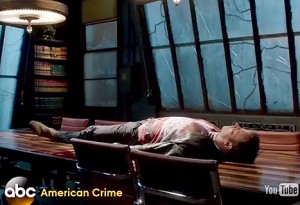I’ve been publishing mysteries since the 90s and whether I want to or not, I often figure out a twist in a thriller or mystery without even trying–especially if it’s a movie or show. I just can’t stop that part of my mind from working even if I want to be an ordinary audience member. And something about seeing it rather than reading it makes the upcoming twist much more obvious to my writer’s mind.
Recently fans of Scandal went berserk when a hero of the show, Jake Ballard, was stabbed and left for dead, and the preview for the next week showed his bloody body laid out on a table, with one of the show’s character’s, Quinn, yelling that he was dead. Even though I was emotionally caught up in the surprise attack where Jake was viciously stabbed, as soon as it was over, I knew for sure that he wasn’t dead. I blogged about it for The Huffington Post while the Twitterverse and Facebook erupted in disbelief and rage. The mystery writer in me knew that when writers want someone indisputably dead, that person’s throat is cut deeply to make sure they die ASAP or they’re stabbed in the head like a zombie ditto or in the heart. Jake was stabbed in the torso; people survive worse injuries in real life and this, after all, was only TV. The next week’s episode proved me right.
 That same week in Vikings, the third season finale ended with great drama. Ragnar Lothbrok, the King whose army had unsuccessfully attacked Paris twice was apparently dying of battle wounds. He’d also been mourning his dead friend Athelstan, a monk captured in an earlier raid on England. In a deal to leave “Francia,” the Vikings received a huge amount of gold and silver, but Ragnar demanded to be baptized and then later get a Christian burial. The Emperor Charles agreed and we saw Ragnar’s beautiful coffin, reminiscent of a Viking ship, borne into the walled city’s cathedral. Watching this impressive scene, I mused, “Wouldn’t it be something if he rose from the dead, popped out of the coffin and attacked the king?” That’s exactly what happened. His funeral Mass was a terrific ruse for sacking the city.
That same week in Vikings, the third season finale ended with great drama. Ragnar Lothbrok, the King whose army had unsuccessfully attacked Paris twice was apparently dying of battle wounds. He’d also been mourning his dead friend Athelstan, a monk captured in an earlier raid on England. In a deal to leave “Francia,” the Vikings received a huge amount of gold and silver, but Ragnar demanded to be baptized and then later get a Christian burial. The Emperor Charles agreed and we saw Ragnar’s beautiful coffin, reminiscent of a Viking ship, borne into the walled city’s cathedral. Watching this impressive scene, I mused, “Wouldn’t it be something if he rose from the dead, popped out of the coffin and attacked the king?” That’s exactly what happened. His funeral Mass was a terrific ruse for sacking the city.
 I wasn’t trying to figure out either plot or second guess the writers, it’s just that the many pleasurable years of writing (and reading) crime fiction have shifted my perspective forever. I don’t enjoy thrillers or mysteries or a show with a plot twist any less, but that inner watchful eye (much friendlier than the Eye of Sauron), just never seems to blink.
I wasn’t trying to figure out either plot or second guess the writers, it’s just that the many pleasurable years of writing (and reading) crime fiction have shifted my perspective forever. I don’t enjoy thrillers or mysteries or a show with a plot twist any less, but that inner watchful eye (much friendlier than the Eye of Sauron), just never seems to blink.
Lev Raphael is the author of 25 books–including The Nick Hoffman Mysteries–which you can find on Amazon and Barnes & Noble.

I’ve been writing and reading mysteries for a long time, myself. I was also a TV critic for over 15. So do I see the endings coming? Sometimes. I used to get really annoyed when I did, until I read a couple books where the characters were so engaging, I didn’t mind. What tends to tip me off is my knowledge of the author. It’s kind of like reading several P.G. Wodehouse novels in a row. You start to notice the patterns. If I read too many mysteries from the same author too close together, I can see things coming more easily. Same as when I watch shows. I’ve got the whole Castle formula down cold.
I love Wodehouse! He’s some of my favorite airplane reading. I finally read that terrific Robert McCrum biography, and this past summer, teaching in London I saw a play based on one of his books and laughed so hard that I cracked up the lead (and almost slid out of my aisle seat). That which was actually in the spirit of the thing because he kept breaking the 4th wall and addressing the audience.
Castle can be dull, I agree, and my spouse and I nail the murderer the first time we see the person and are almost always right. The only reason to watch is for sometimes witty dialogue. We knew instantly who the killer was on that recent plane episode, ditto on the SNL episode, etc. It’s just too obvious.
Yes; sometime television plots are all too predictable! I remember one scene in particular in which a lawyer held his wine glass in front of a window, a little too far away from his body. I announced to the family, “Someone is going to shoot through the window and shatter the wine glass.” A second later it happened.
Yes, windows are always dead giveaways. 🙂 I marvel at how many times TV writers have people, especially in New York or other big cities, leave their windows bare (curtains or shades undrawn or not pulled down) at night. Or when characters in danger blithely stand in front of windows. You just wait for the bullet…..
Great post! I think the previous two comments well-illustrate the dilemma with visual mysteries/thrillers, such as movies or television shows. In a novel the clues can be (and are often) slid in among hundreds of thousands of words, or entrenched in the early chapters so the audience can forget about it by the time the climax arrives. In a film, a good director should also try to do that but the mediocre ones will often need to visually highlight the clues or use ‘tricks’ (like those mentioned above) that pretend to set up the audience for one event and allow another to come crashing in like a buffalo in Tiffany’s as opposed to using a semblance of finesse. (Is it that novelists, almost by definition, must have more respect for a reader of a book, because it’s a more challenging activity than simply taking in a film?)
I remember (and laugh heartily at) Roger Ebert’s infamous 1-star review of ‘The Usual Suspects,’ believing the ending to be a cheat. But I think it’s a prime example of expert mystery filmmaking, audacious to put all of the necessary clues right in front of the audience’s eyes – for almost two hours – and still manage to pull off a surprise ending.